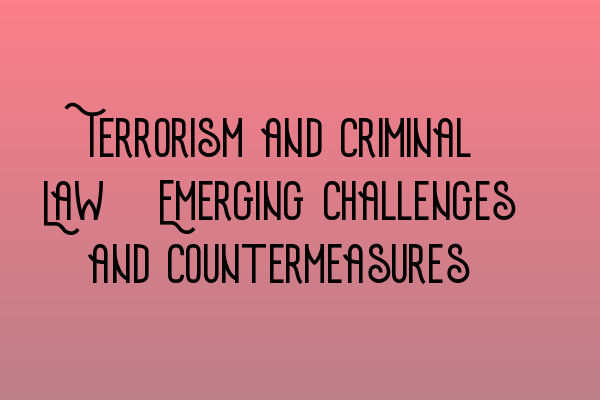Terrorism and Criminal Law: Emerging Challenges and Countermeasures
Terrorism is a global menace that continues to pose significant threats to the safety and security of nations all over the world. In recent years, the rise of extremist ideologies and the advancement of technology have presented new challenges to the criminal justice system. This blog post will explore the emerging challenges faced by criminal law in dealing with terrorism and the countermeasures that have been implemented to combat this grave issue.
The Evolution of Terrorism
Terrorism has evolved significantly over the years, adapting to the changing socio-political landscape and taking advantage of technological advancements. In the past, terrorism was primarily carried out by well-defined organizations with hierarchical structures. However, with the growth of the internet and social media, terrorist groups have gained the ability to reach a global audience and recruit individuals on an unprecedented scale.
The use of encryption technology and online platforms has made it increasingly difficult for law enforcement agencies to track and intercept terrorist communications. This poses a significant challenge in gathering evidence and preventing potential attacks.
The Legal Response
In response to the evolving nature of terrorism, criminal law has been continuously adapted to meet the emerging challenges. Governments have introduced legislation and policies to strengthen their ability to detect and prosecute acts of terrorism.
One important aspect of this response is the expansion of the definition of terrorism. Previously, terrorism was often associated with large-scale attacks carried out by organized groups. However, the definition has now been broadened to include acts committed by individuals or smaller cells, as well as actions that support or glorify terrorism.
Legislation has also been enacted to enhance surveillance capabilities. Law enforcement agencies now have the authority to monitor electronic communications, subject to appropriate legal safeguards, in order to detect and prevent terrorist activities. This allows for the interception of encrypted messages and the gathering of crucial intelligence.
The Role of International Cooperation
The cross-border nature of terrorism necessitates close cooperation between nations. International organizations, such as Interpol and Europol, play a vital role in facilitating collaboration among law enforcement agencies worldwide.
Mutual legal assistance treaties and extradition agreements have been established to ensure the smooth sharing of information and the extradition of individuals involved in terrorist activities. These agreements enable prosecutors to bring terrorists to justice, regardless of their location.
Countering Radicalization
Preventing terrorism requires addressing the root causes and countering the radicalization process. Governments and non-governmental organizations have been implementing various strategies to counter radical ideologies and prevent the recruitment of individuals into terrorist organizations.
Education and awareness programs have been developed to promote tolerance, critical thinking, and respect for diversity. By equipping individuals with the necessary skills to critically evaluate extremist narratives, societies can reduce the appeal of terrorist ideologies.
Social media platforms have also taken steps to combat extremism online. They have implemented algorithms and reporting mechanisms to detect and remove terrorist content swiftly. In addition, efforts have been made to redirect individuals searching for extremist material towards counter-narratives and rehabilitation resources.
Conclusion
Terrorism presents an ongoing threat that requires constant adaptation and innovation within the criminal justice system. The challenges posed by emerging technologies, encryption, and global connectivity must be met with effective countermeasures.
Through international cooperation, legislative reforms, and proactive strategies to counter radicalization, societies can work together to combat terrorism and ensure the safety and security of their citizens.
Related Articles:
- Legal Representation for Delaware LLCs in the UK: Expert Advice
- Ensuring Ethical Business Practices: Delaware’s Code of Conduct
- Legal Challenges for UK Businesses in the U.S.: Strategies for Overcoming Hurdles
- Legal Challenges for UK Businesses in the U.S.: Strategies for Overcoming Hurdles
- SQE Exam Prep: Essential Study Materials for Aspiring Solicitors
